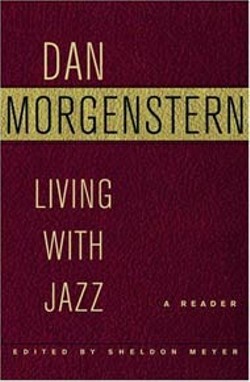Living with Jazz, Comprehending Audio Culture
Strong Morgenstern collection, essays on post-modern music
What makes this European emigre's writings so worthwhile is both the depth of his knowledge and the humanity of his profiles. Take this bit of analysis from his essay on tenor sax great Coleman Hawkins, and how the Old Lion was wise enough to know that Parker had something to teach him, too:
"In its basically linear conception of jazz history, the critical-historical establishment has paid far too little attention to musical influence as a circular phenomenon. Hawkins is a primary example of the fact that great artists don't reach a plateau and stay there, but continue to listen and evolve."
Even in a limited format like the liner notes to one of John Coltrane's live releases, Morgenstern gets right to the heart of the matter:
"Moreover, once he had discovered a way that seemed right for him, and within which he achieved mastery of content and execution and invented a language that gave him recognition and made him an influence, he abandoned this way just as he began to have perfection within his grasp. Instead, he searched anew (this time in the limelight, which took great courage), and the search became the essence of his new self, with perfection no longer even an issue, much less an achievable goal."
As a summation of Coltrane's eternally restless spirit, that may stand without parallel. The same may one day be said of Morgenstern and this highly recommended collection.
By John Schacht
Notes on New Music Describing Audio Culture: Readings in Modern Music (Christoph Cox, Daniel Warner, eds., Continuum, 454 pages, $19.95) in print presents much the same problems as does listening to the music that it proposes to cover. Just what the hell is it? Despite its title, Audio Culture more often than not speaks to what might be better termed "Postmodern" music: things like DJ culture, dub-based reggae, free jazz, minimalist composition, and collage and noise-based music. Appropriately, the book features dozens of soundbite-style pieces by the likes of authors William S. Burroughs and Umberto Eco, musical pioneers like Anthony Braxton, Edgard Varese, Karlheinz Stockhausen, John Cage, Brian Eno and Ornette Coleman, media theorists like the legendary Marshall McLuhan, philosophers like Jacques Barzun, and computer-based musicians like Aphex Twin and DJ Spooky. An all-star lineup of individualist/iconoclasts, if you will.
As you might expect, the writing in Audio Culture is nearly as free-form as the music it proposes to flesh out. Yet, the book is still eminently readable (in a choose-your-illusion, tapas-menu kind of way), and experimental music enthusiasts and the pipe-and-elbow patch crowd should find plenty in here to pique their interest.
Perhaps the book's strongest asset is its form — or, in this case, its lack thereof. Audio Culture doesn't limit itself to traditional ways of looking at music, just as it doesn't limit its rogue's gallery of contributors (Burroughs, for instance, describes how his famous "cut-up" technique works equally well with audio and video tape, and John Cage's summation of his aesthetic philosophies consists of a number of aphorisms: "Art = imitation of nature in her manner of operation" being one of the better ones.)
Thankfully, topics such as minimalist composition and noise-based music are finally given some long-overdue critical attention, with the underlying suggestion being that the formation of such musics isn't all that different from artistic movements in other art forms (Minimalist composition = Rothko and Mondrian, say; Noise = Pollock and de Kooning).
By now, depending on your proclivities, you're probably either watering at the mouth or checking out our movie listings. Doesn't matter either way. As Audio Culture posits, ignorance on either side's part is the only true killer of music, whereas true creativity lasts (and creates) a lifetime.
By Timothy C. Davis
Speaking of Vibes_feature2.html
-
Hillbilly Pleasures
Jul 20, 2005 -

Plug & Pray
Jul 13, 2005 -

Indie rules
Jul 6, 2005 - More »
Latest in Music Features
Calendar
-
Hozier - Unreal Unearth Tour 2024 @ PNC Music Pavilion
-
The Rock Orchestra By Candlelight @ N.C. Music Factory
-
Beach Fossils with friends Nation of Language @ The Underground
-

Haw River Wine Tasting @ Carolina Beer Temple.
-
ATTILA, BORN OF OSIRIS w/ TRAITORS, EXTORTIONIST, NOT ENOUGH SPACE @ The Underground
-
Charlotte Video Project: Forever FC
From Sept. 11 through Sept. 15, Vibes will unveil 11 music-related videos.
-
Justin Fedor's tribute shows benefit Levine Children's Hospital
Charlotte musician's concert series takes place at the Neighborhood Theatre
-
Live review: Kings of Leon 21
A live review, photos and setlist from the Kings of Leon concert at Bojangles Coliseum on April 30, 2009.














